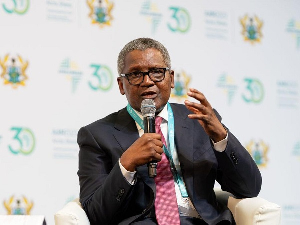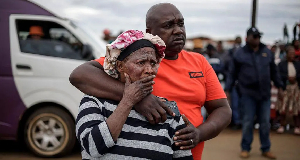A GNA Feature by Christabel Addo
Accra, April 20, GNA - Every minute a woman dies from complications in pregnancy and childbirth, that means 1,400 women die every day, while over half a million die each year with millions more suffering from disabilities, says a World Health Organisation report. As if this is not alarming, every minute, 20 children under the age of five years die, meaning nearly 30,000 children die every day with new born babies less than one month old being at greater risk. A gloomy global picture of 500,000 maternal deaths and about 10.6 million infant mortality rates annually, has been recorded, indicating that the problem has reached global crises and must be given urgent attention.
In Ghana alone, 812 women died in the various health facilities in the year 2004, while many more died outside these health facilities due to pregnancy related complications and child birth. On April 7, Ghanaians joined the rest of the world to celebrate another World Health Day, celebrated annually to highlight the importance of healthcare for all.
Would this year's celebration be considered one of the normal rituals of WHO celebrating yet another health day or would this year be treated differently, as the lives of such a large number of our mothers and future leaders are at stake?
This year's celebration, however, focused on the health of mothers and children under the slogan: "Make Every Mother and Child Count". The choice of this slogan is to create a momentum that would compel governments, the international community, civil society and individuals to take actions that would improve the health and well being of mothers and children.
The celebration is aimed at generating enthusiasm, solidarity, support and most of all actions to improve the survival, health and well being of all mothers and children.
In developing countries, pregnancy and childbirth are major causes of death for women of reproductive age, while for children, one child in 12 does not reach his or her fifth birthday, yet the fate of these women and children are too often overlooked or ignored.
The World Health Day would further awaken government and the international community to the realities and suffering of these vulnerable groups and the need to make their health a top priority. In a statement to mark this year's World Health Day, Dr Lee Jong-Wook, Director-General of the World Health Organisation, said most of these deaths could be prevented with well-known interventions if only they were more widely available.
He noted that in coming up with the Millennium Development Goals, four years ago, the international community made a commitment to reduce maternal deaths by three quarters and reduce child mortality by two thirds, by the year 2015.
He said the Day was, therefore, offered a unique opportunity, not just to highlight the magnitude of the problem, but also to bring all stakeholders together to apply the solutions that work. The Government, through the Ministry of Health (MOH) and the Ghana Health Service (GHS) has put in place some programmes and interventions to create awareness, provide free cure support services, including both pre-natal and antenatal care for women and children, as well as provide family planning services in all communities, as effort to reduce infant and maternal mortality rates in the country.
In spite of all these programmes and interventions the story has not changed much. The trend since the 80s had been very discouraging. A survey by the GHS indicated that though infant mortality declined from 77 deaths per 100,000 live births in 1988 to 57 deaths per 100,000 live births in 1998, it increased again to 64 deaths per 100,000 live births in 2003.
Under-five mortality rates also declined from 155 per 100,000 in 1988 to 119 deaths per 100,000 live births in 1993. The figure further declined to 108 deaths per 100,000 live births in 1998, but again increased by three per cent, bringing the figure to 111 deaths per 100,000 live births in 2003.
Looking at the continuous fluctuation in the above figures, the need for more detailed researches to determine causal factors is urgently required to be able to tackle the problem from the right perspective.
There is no doubt that healthy mothers and children are the real wealth of societies. The survival and the well being of mothers and children are not only important in their own right, but are also central to solving much broader economic, social and developmental challenges. When mothers and children die or are sick, their families, communities and nations suffer as well. Improving the survival and well being of mothers and children would not only increase the health of societies but would also reduce inequity and poverty. WHO notes that ill health is one of the principal reasons why households become poor and remain poor.
Sick mothers and children require increased family expenditure. Fees and other out-of-pocket costs are a significant deterrent for families seeking health care, leading to dangerous delays in seeking help outside the household, particularly for children and pregnant mothers. Good child health is imperative for economic and social development, as it has been estimated that for every dollar invested in child health, seven dollars are returned through reduced spending on social welfare and increased productivity of young people and adults. Frequent ill health and malnutrition negatively affect cognitive development, body size and strength of young children. This reduces final educational achievement as well as productivity and work capacity in later life.
There have been efforts in Ghana to intensify awareness on maternal health care and deal with some preventable diseases that cause early childhood deaths.
Dr Isabella Sagoe-Moses, Child Health Coordinator of GHS, said there are numerous ongoing educational programmes to educate the public on some preventive methods on pregnancy related abnormalities, pre and post-natal care, immunization and nutrition for both nursing mothers and children.
She said enough efforts had already gone into Information Education and Communication (IEC), which had yielded some impact. "Mothers are thought about warning signs during pregnancies, in children and the need to attach much importance to antenatal clinics". She said it was, however, worrying to note that some women still relied on traditional remedies for the treatment of certain illnesses. She also attributed the high death rates in both women and children to delay in seeking treatment; failure to recognise warning signs, during pregnancy and labour, delay to health facilities due to transportation problems and delay at health institutions, due to cumbersome bureaucratic procedures of registration.
"We also need to critically examine certain customs such as a taboos that prevent women and children from seeking medical attention without the permission of their husbands or relations and further prevent pregnant women and children from eating certain foods that would have otherwise improved their nutritional status and keep them healthy," she said.
"Transportation and lack of equipment in health facilities are other hindrances to quality health care.
Millions of lives could be saved using knowledge we have today, but the challenge is to transform these knowledge into action. To reduce maternal deaths dramatically, all women need access to high -quality health care delivery and with at least three key elements: skilled care at birth, emergency obstetric care in case of complications and a functioning referral system which ensures access to emergency care if needed.
Another key solution is helping women to avoid unwanted pregnancies and births. Social support should be available for women during labour and birth; breastfeeding should start within an hour after birth. The WHO have estimated that more than six million children could be saved each year if they were reached by a small set of preventive and curative interventions such as appropriate home care including optimal feeding practices and using insecticide-treated materials to prevent the transmission of malaria and other infections as well as immunisation against all the early childhood illnesses.
Dr Henrietta Odoi-Agyarko, Director of Public Health of the GHS, said the launching ceremony on April 7 only marked the beginning of a wider attack on the prevention of infant and maternal mortality in the country, as series of activities including workshops, community outreach programmes to educate women would be carried out through out the year nation-wide.
Regional News of Friday, 22 April 2005
Source: GNA












